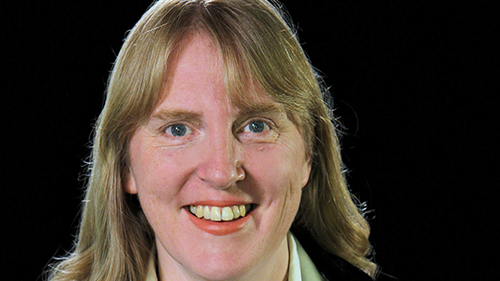
Helen Caines, a physicist whose research has revealed important insights into the behavior of nuclear matter under extremes of temperature and density, was recently appointed the Horace D. Taft Professor of Physics, effective immediately.
She is a member of Faculty of Arts and Sciences (FAS) in the Department of Physics and is a member of the Yale Wright Laboratory.
Caines, whose research group is currently supported by grants from the U.S. Department of Energy, is a collaborator on the STAR experiment based at the Relativistic Heavy Ion Collider (RHIC) at Brookhaven National Laboratory. She was the STAR elected co-spokesperson from 2017-2023 and is also involved with the ALICE experiment at the Large Hadron Collider at CERN, the world’s largest and most powerful particle accelerator, located near Geneva, Switzerland. Most recently Caines joined the ePIC collaboration, the experiment selected to be installed at the future Electron-Ion Collider, a one-of-a-kind particle collider scheduled to begin operations at Brookhaven National Laboratory in the early 2030s. She is an author or co-author on more than 700 peer-reviewed publications.
Caines and her research group use collisions of nuclei traveling at relativistic speeds to create and study the Quark Gluon Plasma (QGP), the state of matter as it existed in the universe shortly after the Big Bang. She played a pivotal role in the preparations and operation of the beam energy scan at the Relativistic Heavy Ion Collider (RHIC). The data STAR collected during this 3-year period is being used to search for the “critical point” in the phase diagram of nuclear matter which marks a change in how the transition to the QGP occurs.
Caines is an elected fellow of the Institute of Physics in the UK and the American Physical Society. She has served on the Nuclear Science Advisory Committee (NSAC) that provides advice and guidance to the Department of Energy and the National Science Foundation on scientific priorities within the field of basic nuclear science research.
Her contributions have helped shape research agendas in her field. Caines has been involved in organizing a number of field-defining workshops and conferences, including the recent Critical Point and Onset of Deconfinement (CPOD) International Conference, the Strangeness in Quark Matter International Conference, and the International Conference on Initial Stages in High Energy Collisions (IS).
An outstanding mentor and teacher, Caines has a sizable research group which currently consists of two research scientists, one associate research scientist, two postdoctoral fellows, and seven graduate students. She also supervises undergraduate researchers and is active in outreach for increasing diversity in physics. She has just finished a term as a member of the American Physics Society’s Committee on Minorities in Physics
Caines earned a B.S. degree and her Ph.D. at the University of Birmingham in Birmingham, England.
This article was originally posted in Yale News on March 6, 2024.